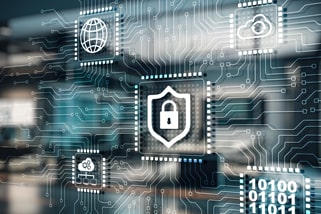B.S. in Computer Science - Cybersecurity
Preparing students for successful careers in the rapidly growing field of cybersecurity
This program is designed for individuals intrigued by the intersection of technology and security, aiming to equip them with a comprehensive understanding of cybersecurity principles and practices. By blending core computer science fundamentals with specialized coursework in cybersecurity, students will gain hands-on experience in threat analysis, secure software development, network defense, and digital forensics. Graduates emerge prepared to navigate the dynamic landscape of cybersecurity, armed with the skills and knowledge necessary to protect critical information systems and contribute to the security posture of organizations across various industries.
Why Earn your Computer Science degree in Cybersecurity?
Cybersecurity analysts are projected to grow much faster than average for other occupations according to the Bureau of Labor Statistics, the median annual salary for a cybersecurity analyst is $112,,000. Furthermore, with the increasing age of the Baby Boomer generation, the number of jobs in this type of role is expected to increase by 32% over the next 10 years -- much faster than the average growth rate of all occupations (3%).
Earning a Bachelor of Science in Computer Science - Cybersecurity offers a unique opportunity to delve into the dynamic and critical field of cybersecurity within the broader realm of computer science. By pursuing this degree, students not only acquire a solid foundation in computer science principles but also gain specialized knowledge and practical skills in identifying, assessing, and mitigating cyber risks. With cybersecurity becoming increasingly integral to the operations and security of businesses, governments, and society as a whole, graduates of this program are well-positioned to pursue diverse and rewarding career opportunities in an ever-expanding field.

About the Program
A cybersecurity program typically covers a wide range of topics related to protecting digital systems, networks, and data from security breaches or attacks. The students might learn the key concepts, terminology, principles of cybersecurity, Cybersecurity Laws and Ethics, the importance of securing information, including data classification, access controls, and cryptography. They are also going to learn about network Security including firewalls, intrusion detection/prevention systems, VPNs, and secure network design. In addition, they are going to learn everything about incident Response and Forensics including the strategies and procedures for responding to security incidents, as well as digital forensics techniques for investigating breaches.
The program may also prepare students for specific certifications depending on its focus and goals. Common certifications that cybersecurity programs may align with include:
- CompTIA Security+
- Certified Information Systems Security Professional (CISSP)
- Certified Ethical Hacker (CEH)
- Certified Information Security Manager (CISM)
- Certified Information Systems Auditor (CISA)
Cybersecurity programs incorporate dedicated labs for hands-on learning experiences. These labs are essential for providing students with practical skills and experience in a controlled environment. Students should care about the various hands-on learning in cybersecurity labs because they provide students with practical skills and experiences that directly translate to real-world cybersecurity roles as many employers often value hands-on experience when hiring cybersecurity professionals. Overall, cybersecurity labs play a crucial role in preparing students for the dynamic and challenging landscape of cybersecurity, equipping them with the practical skills and knowledge needed to succeed in the field.
The program includes dedicated courses in cybersecurity, network security, and digital
forensics which was consistently flagged as an area of high priority in our conversations
with cybersecurity professionals due to the increasing complexity of security systems.
- Master cybersecurity fundamentals, including understanding cyber threats and network security principles.
- Understand the cryptography principles and their application for data protection.
- Identify vulnerabilities in different software and conduct ethical hacking for vulnerability assessment and evaluation.
- Develop and implement incident response plans and system recovery, including digital forensic investigations.
- Ensure compliance with relevant laws, regulations, and industry standards while applying cybersecurity skills to solve real-world problems.
Prospective students should consider choosing Saint Xavier University for their degree for its unwavering commitment to academic excellence and personalized student support. With a distinguished faculty dedicated to both teaching and mentorship, students benefit from small class sizes and individualized attention, fostering an environment conducive to learning and growth. Additionally, Saint Xavier University's emphasis on ethical leadership, social justice, and community service aligns with the values of aspiring professionals seeking to make a positive impact in their fields and society at large. Located in the vibrant city of Chicago, students have access to a wealth of cultural, professional, and experiential learning opportunities. Coupled with robust career preparation resources, including internship programs and career services, Saint Xavier University equips students with the skills, knowledge, and connections necessary for success in their chosen careers.
The Game Design minor offered by the College of Liberal Arts and Education is an excellent complement to the Computer Science - Game Development major. This minor has significant career potential as it provides grounding in digital and web design.
The Computer Science minor is an alternative to the Computer Science - Game Development major. It consists of six courses, four of which are electives. The student can choose game development courses to fulfill the elective requirements.
Quick Links
Request Information
Want to know more about graduate programs at Saint Xavier University? Please fill out the form below!
Contact the Office of Admission
- 773-298-3050
- Toll Free: 844-GOTO-SXU (844-468-6798)
- Fax: 773-298-3076
- Email: admissionFREESXU
- M-F: 8:30 a.m. to 4:30 p.m.
contact us





